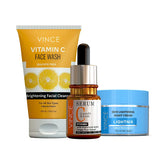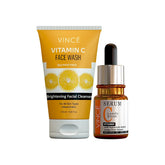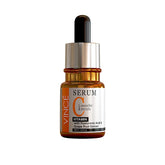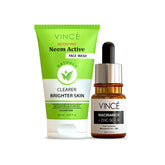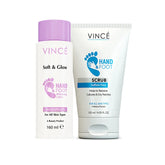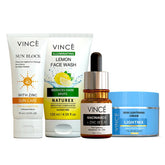Does Sunscreen Cause Acne? Best SPF Tips for Clear Skin

You are not alone if you have ever used sunscreen and then experienced breakouts shortly after. Many people with skin prone to acne are concerned about whether sunscreen clogs pores or exacerbates imperfections.
So, does acne result from wearing sunscreen? Depending on the kind of sunscreen you are using and how it affects your skin, the answer is not as simple as yes or no.
This guide will teach you how to choose the best SPF, the truth about sunscreen breakouts, and how to protect your skin without getting acne.
This blog post will provide acne-safe sunscreen solutions and wise SPF advice to keep your skin clear and protected, regardless of whether you have oily skin, live in a hot, humid place like Dubai, or are managing sensitivity.
Why Sunscreen is Essential—Even for Acne-Prone Skin
Using sunscreen is more essential because sun exposure causes acne scars and pigmentation, and some acne treatments are not safe for the skin; it can make skin more sensitive. Sun damage can cause premature aging, inflammation, and an increased risk of skin cancer.
Always choose the right sunscreen for sun protection and use it during the daytime, even on cloudy days, especially when you are living in a hot environment.
Does Sunscreen Cause Acne?
It depends on sunscreen; some sunscreens cause breakouts and clog pores. Breakouts occur due to formulations that trap heat and bacteria. Products that contain fragrance and alcohols can irritate acne-prone skin. Always use sunscreen that contains non-comedogenic oil-free or acne-safe ingredients.
Chemical vs. Mineral Sunscreen: Which Is Better for Acne?
Chemical sunscreen absorbs heat and UV rays, but mineral sunscreen reflects UV rays. Mineral sunscreen does not cause clogged pores. It is ideal for oily skin as this sunscreen contains zinc oxide and titanium oxide, which can soothe your skin. Also, mineral sunscreen is best for acne-prone, oily, or sensitive skin types
Sweating is normal, especially in hot areas, so mineral sunscreen can control sweating and reduce breakouts.
Important Link: Sunscreen vs Sunblock what’s the Difference
Choosing the Right Sunscreen for Acne-Prone Skin
Choose the right sunscreen to control acne. Use oil-free, fragrance-free, broad-spectrum SPF 30 or a lightweight gel-based sunscreen, and avoid comedogenic ingredients such as coconut oil and cocoa butter. It prevents blackheads and whiteheads.
Reduces the risk of cystic acne and is suitable for daily use without buildup. Also, use lightweight products on your skin when you apply new sunscreen.
You can do a patch test on your hand before using it on your face. Apply sunscreen daily to protect your skin, and reapply it after sweating or swimming.
Sunscreen Breakouts: What’s Causing Them?
Breakouts are caused by using a thick layer of products on your skin that are comedogenic. Applying sunscreen on clean skin makes it easy to absorb into the skin, making it more effective. If you want to control breakouts, use acne-safe sunscreen. Cleanse your face at night. Use blotting papers before reapplying. Apply SPF powders or mists for reapplication.
Best SPF for Oily Skin
Oily skin requires a sunscreen that is a gel-based or water-based formula, use SPF 30 to SPF 50 with broad-spectrum protection, and use products that contain niacinamide or silica for oil control.
Use Vince's Sunblock SPF 50 it has a lightweight, soft texture that combines an anti-UVB filter with Titanium dioxide.
Titanium dioxide works as a UV filtering ingredient in sunblock, helping to protect a person's skin by blocking absorption of the sun’s ultraviolet light that can cause sunburn. Ultraviolet rays from the sun can damage the cells in your body.

Mineral Sunscreen in Dubai: The Best Option for Hot Climates
Mineral sunscreen does not cause clogged pores. It is ideal for oily skin as this sunscreen contains zinc oxide and titanium oxide, which can soothe your skin.
Vince's Sunblock SPF 35 is a 100% mineral, skin-brightening, and water-resistant formula that helps to provide strong protection against the sun’s harmful UV rays while keeping skin smooth and dewy for a long-lasting effect. It is best for a hot climate.
Its lightweight, non-greasy texture provides a shield against sun damage and reduces the risk of skin darkening, pigmentation, and premature aging.
Apply Vince Whitening Sunblock SPF 35 on a clean face, neck, hands, and feet, or any other specific area that might be exposed to the sun. Massage gently until it absorbs completely.

SPF for Sensitive Skin
Vince's Sunblock SPF 75 is best for sensitive skin. It has a lightweight, soft texture that combines anti-UVB filters with Titanium dioxide. Titanium dioxide works as a UV filtering ingredient in sunblocks, helping protect a person's skin by blocking absorption of the sun’s ultraviolet light that can cause sunburn. A higher SPF blocks out more rays & offers slightly more protection.
Vince Sun Block SPF 75 is the latest scientifically developed moisturizing oil-free lotion that helps protect the skin against UVA and UVB rays, and also helps to reduce the formation of dark spots and discoloration.

Acne-Safe Sunscreen: What to Look For
Sunscreen that is safe for acne is more than just non-comedogenic. Avoid the ingredients that inflame and irritate your acne.
Features of a great acne-safe sunscreen:
-
Non-comedogenic
-
Oil-free
-
Fast-absorbing, matte texture
-
Doesn’t leave a greasy residue
- Lightweight but protective (SPF 30–50)
Important Link: Best Sunscreen Tips for Dark Skin in Dubai
UV Protection for Acne-Prone Skin
Add sunscreen to your daily morning routine; it can protect your skin from sun damage. Use sunscreen even on cloudy days and outdoors; these rays cause sun aging, sunburn, and also damage skin cells.
Not including sunscreen in your skin care routine can lead to darkened acne scars, delayed healing of active pimples, more inflammation, and redness.
- Use board spectrum sunscreen, which can protect your skin
- Use a non-comedogenic sunscreen formula that won’t cause clogged pores or acne
- Prefer using a sunscreen that contains zinc oxide, which can't irritate your skin
- Lightweight sunscreen won't feel heavy on your skin
Conclusion
Sunscreen itself does not cause acne, but certain ingredients in some sunscreens can clog pores or irritate the skin, leading to breakouts. To enjoy the benefits of sunscreen while maintaining clear skin, choose a non-comedogenic, oil-free, and fragrance-free formula with an SPF of at least 30.
Look for physical sunscreens containing zinc oxide or titanium dioxide, which provide broad-spectrum protection without clogging pores.
Apply sunscreen daily, even on cloudy days, and reapply every 2 hours or immediately after swimming or sweating. By selecting the right sunscreen and following these tips, you can protect your skin from the sun's harmful rays while minimizing the risk of acne and maintaining a healthy, glowing complexion.
Additionally, patch testing new sunscreens, choosing lightweight textures, and avoiding comedogenic ingredients can further help prevent breakouts.
With the right sunscreen, you can enjoy radiant, protected skin without compromising your skin's health. Regular use of sunscreen can also help prevent dark spots, reduce inflammation, and protect your skin from premature aging.
By making sunscreen a part of your daily skincare routine, you can achieve a brighter, more even-toned complexion. Just be careful about your skin type before choosing the sunscreen.
Frequently Asked Questions (FAQs)
Q1: Does sunscreen clog pores and cause acne?
Always use Vince's Sunblock SPF 35 as it is a 100% mineral, skin-brightening, and water-resistant formula that helps to provide strong protection against the sun’s harmful UV rays while keeping skin smooth and dewy for a long-lasting effect. It is best for a hot climate.
Its lightweight, non-greasy texture provides a shield against sun damage and reduces the risk of skin darkening, pigmentation, and premature aging.
Q2: What type of sunscreen is best for acne-prone skin in Dubai?
The best sunscreen for acne-prone skin in Dubai is a lightweight, mattifying mineral sunscreen with SPF 50 or higher. Look for water-resistant and non-comedogenic formulas to withstand heat and humidity without causing breakouts.
Use Vince's Sunblock SPF 50; it has a lightweight, soft texture that combines an anti-UVB filter with Titanium dioxide.
Q3: How can I prevent breakouts caused by sunscreen?
-
Choose acne-safe sunscreen
-
Double cleanse to remove SPF at night
-
Reapply with SPF mists or powders instead of layering thick creams
-
Avoid applying sunscreen over active pimples—dab gently around them
Q4: Should I skip sunscreen if I have acne?
No, you shouldn't skip sunscreen even if you have acne. Sunscreen is essential for protecting your skin from the sun's harmful UV rays, which can cause further damage, darkening of acne scars, and premature aging. Instead of skipping sunscreen, look for products labeled "non-comedogenic" or "oil-free" that are specifically designed for acne-prone skin.
Q5: Is tinted sunscreen good for oily or acne-prone skin?
Yes, if it's non-comedogenic and oil-free. Tinted sunscreens often contain iron oxides, which help protect against visible light (which contributes to pigmentation). They also help even out skin tone without the need for heavy makeup.
Additionally, many tinted sunscreens offer sheer to medium coverage, which can help even out skin tone without feeling heavy or cakey. When choosing a tinted sunscreen for oily or acne-prone skin, opt for products labeled "oil-free" or "non-acnegenic" and patch test before using it on your face to ensure compatibility.

 KSA
KSA
